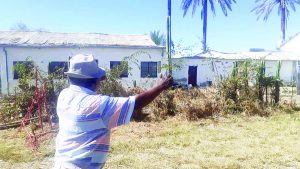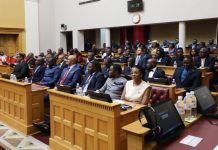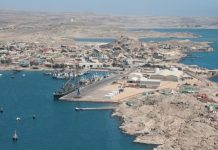By Sonja Smith | 27 August 2021
A SAN community living on a farm sold by prime minister Saara Kuugongelwa-Amadhila and her husband in 2020 says the premier has left the farmhouse to “rats and snakes”.
The prime minister was an absent landlord from the land she eventually made around N$8,9 million from, the community says.
They say Kuugongelwa-Amadhila also failed to deliver the documentation for their land-resettlement requests to the president.
“They took the cattle, horses and donkeys,” a community leader told The Namibian two months ago.
The group of people lives at farm Duwib, 100 km west of Grootfontein in the Otjozondjupa region along a dusty road close to Tsintsabis.
This land, which measures around 7 700 ha, accommodates around 1 300 people.
The San had been living on the land for more than a century.
The land is part of two farms that have been the subject of media reports and fierce debates in parliament earlier this year.
In 2007 its previous owner, German national Karl-Heinz Friederich, offered to sell the farms to the government to resettle the needy San community.
However, the government rejected Friederich’s offer.
The government said that Friederich later sold the farms to a farmer named Nico Grundeling.
Kuugongelwa-Amadhila and her husband, Onesmus ‘Tona’ Amadhila, bought the two farms in 2011 for N$5, 5 million.
They sold the two farms Duwib and Agenab No. 760 to the government for N$14,4 million.
The prime minister and her husband made a N$8,9 million profit through their company called Seize The Moment Investment CC, which owned the land.
Ironically, the government has in the past complained about the sale of farmland through close corporations.
This transaction points to an ongoing trend of the political elite continuing to profit from or occupy land that accommodates the most vulnerable and marginalised communities in society.
Opposition lawmakers have raised serious concerns about the sale of the farms, calling for an investigation into the process that effectively saw the prime minister and her husband buy the farms.
Kuugongelwa-Amadhila last week publicly released some answers to questions The Namibian sent to her.
She denied any wrongdoing.
ON THE GROUND
The Namibian visited the farms two months ago.

Johannes Khaniseb, the headman of the community, known as Hai//om Duwib, shared the community’s suffering after the farm was sold to the Amadhilas.
“It was around 2014. She [Kuugongelwa-Amadhila] came here and we felt relieved to see her. We told her all the problems we had on the farm, and gave her the documents Friederich left us,” he said.
He said the idea was for Kuugongelwa-Amadhila “to take them (the documents) to the president to have the state decide how to resettle us, because the documents clearly say we must be resettled”.
Khaniseb said the prime minister never did so.
“… and we do not know what she did with the documents,” he said.
Khaniseb took The Namibian on a tour of the two farms.
“In this letter, Friederich’s wife gave us the cattle. She could pay us all out, but gave us the cattle instead so we could make a living out of it. Now, everything we were given is gone.
They took the cattle, horses and donkeys,” Khaniseb said, pointing at one empty kraal.
He said the community at the time noticed the cattle being taken to a nearby post to be sold.
As soon as the Amadhilas took over the farm, the community was denied access to the items the Friederichs left them, he said.
“They would come here, not greet or even engage us. They sold the cattle and did not bring us any money or explain where they took it,” he said.
Metres away is a white four bedroomed house in which the German couple once lived – dilapidated and overtaken by rats.
Khaniseb said the house used to be well taken care of.
“Look at the house. It has been standing like this since they [the Friederichs] left. Does this look like a house a prime minister could sleep in?
“They never took care of the house. They have never even slept in that house. They have left it to snakes and rats.”
Khaniseb said the community was not informned of the sale of the house.
‘THEY GAVE IT TO ME’
The group says they sent copies of the resettlement-request documents to the deputy minister of marginalised communities, Royal /Ui/o/oo, as well.
“I met minister /Ui/o/oo at a meeting at Tsintsabis. I explained to him about the documents, about our problems on the farm and that we needed the president to intervene by making sure he gets these documents. No response has been provided until today,” Khaniseb said.
/Ui/o/oo admitted he was given the documents.
“I probably just gave it to my personal assistant. I would have to check my files,” he said.
“I have not ignored them. I know their struggle, and it does not make me happy either. I have been fighting for them, but I am alone. I have no backup from the traditional authorities,” he said.
EXCLUDED
The San community showed The Namibian a letter which Friederich wrote to then deputy prime minister Libertina Amathila, which they claim they handed to Kuugongelwa-Amadhila in 2014 when she was minister of finance.
The letter, written in 2007, contains Friederich’s wish that his farms be sold to the government to enable the community’s resettlement.
Minister of agriculture, water and land reform Calle Schlettwein has previously said his ministry has not received a letter pertaining to Friedrich’s intentions.
‘GERMANS TREATED US BETTER’
Two months ago, the farm community comprised 100 people.
The community has no source of income and relies on its pensioners’ government grants.
Martha !amises, a community member, said: “Life on the farm has become tough. We get little food from the government.”
!amises (54) was born on the farm and said life was good when the Friederichs owned it.
Selma Oukames (49), another community member, said during Friederich’s time, the community was properly taken care of.
Their children were assisted with transport to school and to the hospital, she said.
She said her parents had access to sewing machines to make clothes, thanks to the German couple.
“They treated us far better. We were like one big family. Now we have nothing,” Oukames said.
DOCUMENTS
The documents the community refers to, which The Namibian has seen, are two letters – one written by Friederich in 2007, and the second by his wife, Dagmar, in July 2015.
Dagmar’s letter is addressed to Olga Gases, the chairperson of the Hai//om council, and details several assets they were leaving to the community.
“I donated the beige small Toyota bakkie, plus a spare part to them. Further, the charcoal kilns to help them create an income for themselves. Whatever may be useful for them, like the maize grinder, or the big wooden boards their women used for painting their materials,” Dagmar’s letter stated.
In addition, she left the community a trailer, a scale, two oil tanks and a harvester.
“If still possible to repair the blue dyna truck. Some donkeys belong to them, some to my late husband. Cattle which were not sold by me because they were feeding in the bush without coming to the trough because of flooding of the farm,” the letter reads.
Olga Gases, the chairperson of the Hai//om council to whom Dagmar’s letter was addressed, said: “Yes, I confirm the authenticity of the letter. Ms Dagmar is at Tsumeb and old. She cannot hear properly. I will continue to fight for the plight of the community. The government should resettle them on that farm, because they have lived there for decades.”
When asked whether the government had plans to settle the Hai//om community,
Schlettwein said: “It is too soon to tell. There will be people to be resettled on the farm, and we are still busy with that process.”
He said the ministry was “waiting for a legal procedure”.
“The community will be part of such a consideration,” he said.
DENIAL
The Namibian sent questions to the prime minister two months ago, which she failed to respond to.
The same questions were sent again this week, informing her of the planned article.
Instead of answering The Namibian, Kuugongelwa-Amadhila released a public statement denying any wrongdoing linked to allegations that she sold the farm at an inflated price and favoured her family in the transaction.
“It was also alleged that the said farm was a resettlement farm which, it was alleged, I grabbed and used to raise a loan to build our residence,” the statement read.
Kuugongelwa-Amadhila said: “These allegations are false and malicious, and seem to be aimed at tarnishing my image and that of my family.”
According to her, it’s also not true that she has been provided with requests for resettlement to convey to the president.
“The allegations that the said communities were deprived of anything that belonged to them during my family’s tenure on the farm are devoid of any truth. The community has, to the contrary, been allowed to reside on the farm with their animals, and they have not been disturbed,” she said.
Kuugongelwa-Amadhila denied being given a list of assets left for the community on the farm by the previous owner.
“… and there were never any such assets on the farm. It is thus untrue that there were cattle and/or equipment or anything else that belonged to or were left for them that were taken away by us or that they were denied to use,” she said.
* The Namibian’s Investigative Unit produced this story. Send story tips via your secure email to investigations@namibian.com.na.






